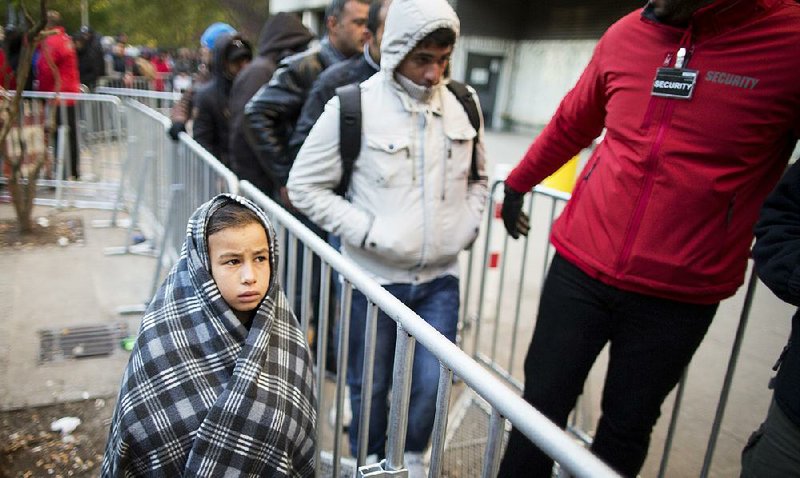ATHENS, Greece -- The United Nations' top official for refugees said Monday that European Union plans to take in about 160,000 migrants are insufficient, and he urged Europe to provide asylum seekers with legal immigration options.
Antonio Guterres said the relocation program is a starting point but is not enough. Speaking in Athens, he called for the EU to accept more refugees and expand beyond Syrians, Iraqis and Eritreans.
His call came as authorities say asylum seekers in France are becoming bolder in attempts to challenge security forces and break through cordons preventing them from reaching Britain, and as Europeans deal with disruptions caused by border controls.
More than 500,000 migrants have entered Europe this year, four-fifths of whom paid to be smuggled by sea from Turkey to Greece.
Guterres, the U.N. high commissioner for refugees, said that "doesn't make sense" when they could have a legal alternative. "We need to increase substantially the forms of people being able to come to Europe legally," he said.
In Britain, hundreds of lawyers, retired judges and academics urged the government to take in more Syrian refugees, saying the offer of 20,000 is "too low, too slow and too narrow."
In a letter published Monday, they said the United Kingdom's offer is "deeply inadequate," noting that in Lebanon -- a country of 5 million -- there are 1.2 million registered Syrian refugees.
The group said that even though the refugees have a right to legal protection, they are being driven "into the hands of people-smugglers.'"
The letter's signees, many of whom have a human-rights background, said many members of the EU make it impossible for people to seek asylum via normal means of travel and that the entire system is dysfunctional.
Greek authorities said Monday that they rescued a total of 1,624 migrants who entered the country in dozens of boats from neighboring Turkey over the past three days.
The coast guard said the migrants were picked up at sea in 47 incidents near Greece's eastern Aegean islands of Lesbos, Kos, Chios, Samos, Leros, Agathonissi and Farmakonissi.
In Calais, France, 200 migrants broke into the Eurotunnel's French terminal over the weekend, clashing with police and prompting an hourslong suspension of the undersea rail service linking France and Britain. John Keefe, a Eurotunnel spokesman, said the "very aggressive and very organized" attempt represented "a different kind of tactic."
"If they can't get through on their preferred route without violence, will they then use violence to get through?" he said. "There has never been any anger before, but this was, 'We don't care. We are going through.'"
Day by day, more people move in, from the Middle East, Africa and South Asia.
With miles of new barbed-wire fences, squadrons of heavily armed police and packs of specially trained dogs, fewer and fewer people are leaving Calais.
The population of the migrant encampment on the edge of the town is estimated to be at least 4,000 and grows by the day.
Set in flood-prone scrubland within sight of the English Channel, sea air mixes with the scents of human waste and burning trash. People who have fled Syria, Iraq, Afghanistan, Eritrea and Sudan find themselves sleeping on cold, damp French soil, with only leaky plastic tents to shelter them from the elements. Inter-ethnic rivalries and disputes over black-market business deals lead to frequent outbreaks of violence.
"It's the worst slum in Western Europe -- maybe even in all of Europe," said Francois Guennoc, a camp volunteer with the aid group L'Auberge des Migrants. "The French and British governments should be ashamed of this situation."
The result is a combustible mix: a growing population of people who don't want to be there and who despair that they will never be able to leave. The mood is increasingly defiant, with asylum seekers becoming bolder in their attempts to challenge security forces head-on and break through to Britain.
Meanwhile, in Salzburg, Austria, the suspension of train service into neighboring Germany has affected the area's residents in numerous ways. It has proved a boon to taxi drivers ferrying stranded travelers to Munich, but it has also disrupted the daily lives of residents who cross the border nearly every day.
Grocery stores on the German side said their business has been halved as Austrian shoppers have been cut off. The local university lifted restrictions on handicapped parking to accommodate all the professors who in the past commuted by train.
Many University of Salzburg faculty members live on the German side, where housing costs are lower. Many have been riding bicycles across the border, a practice that won't last much longer as autumn begins to chill the Alps.
None of the train and border disruptions have had a widespread economic effect, observers said, because the restrictions are limited to a few crossings. And at those, the borders have not been completely sealed. Drivers are enduring the waits or going out of their way to find alternate crossings.
Migrants, too, continue to get through, observers said. An unknown number have crossed by foot or in hired vans and taxis at border points that remain unpatrolled.
Information for this article was contributed by staff members of The Associated Press and by Griff Witte, Shannon Jensen, Cleophee Demoustier, Karla Adam, Steve Hendrix and Nicole Lundeen of The Washington Post.
A Section on 10/13/2015

